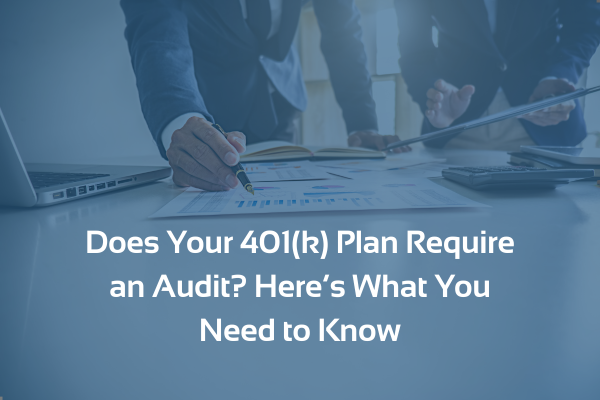
As a business grows and its retirement plan matures, the question often arises: “Do we need a 401(k) audit?” The answer depends on a few key factors, including the number of participants in your plan and specific IRS and Department of Labor (DOL) regulations.
In this blog, we’ll break down what triggers an audit, why it’s required, and what the audit process typically entails.
What Triggers a 401(k) Audit?
The primary factor that triggers a 401(k) audit is the number of participants with account balances in your plan as of the first day of the plan year. According to the Department of Labor:
- Plans with fewer than 100 participants with account balances are typically classified as “small plans” and are generally not required to undergo an audit.
- Plans with 100 or more participants with account balances at the beginning of the plan year are considered “large plans” and must file Form 5500 with an independent audit report attached.
This means even if you only have 80 employees actively contributing, but 20 former employees still have account balances, your plan could be over the threshold.
The 80-120 Participant Rule
There’s a special rule known as the 80-120 participant rule, which offers some flexibility. If your plan had between 80 and 120 participants on the first day of the current plan year and filed as a small plan in the previous year, you can continue to file as a small plan and avoid the audit in the current year.
Why Does My 401(k) Plan Require an Audit?
A 401(k) audit is not just a regulatory burden — it’s an essential step in protecting the interests of plan participants and ensuring the plan complies with ERISA (Employee Retirement Income Security Act), IRS, and DOL rules. The audit helps:
- Confirm the accuracy and completeness of plan transactions.
- Ensure the plan is being administered according to its plan document..
- Detect and correct compliance errors such as untimely contributions or ineligible participants.
Essentially, the audit is designed to ensure that the plan is operating fairly and transparently for all participants.
What Are the Audit Requirements for a 401(k) Plan?
If your plan meets the criteria of a large plan, the DOL requires that you obtain an independent qualified public accountant (IQPA) to conduct the audit. The independent auditor’s report must be attached to the Form 5500 by the annual deadline, which is generally seven months after the end of the plan year (July 31 for calendar-year plans, with potential extensions).
There are two types of audits:
- ERISA Section 103(a)(3)(c) – The most common, where the auditor relies on a bank or trustee’s certified investment statements.
- ERISA Non-section 103(a)(3)(c) – Required if proper certifications are unavailable.
Final Thoughts
If your business is approaching or has crossed the 100-participant threshold, now is the time to evaluate your 401(k) plan’s audit obligations. Staying ahead of the requirements will help you avoid penalties, manage costs, and ensure your retirement plan remains in compliance.
Need help navigating the 401(k) audit process or unsure if your plan qualifies? Reach out to your plan administrator, third-party administrator (TPA), or a qualified auditor for a compliance review.
Have questions about auditing your 401(k)? Contact MRPR today.
Author:

Erica Braun, CPA Principal
